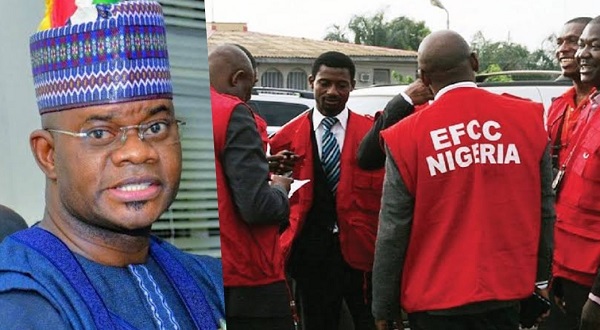The Economic and Financial Crimes Commission (EFCC) has arrested Yahaya Bello, the former governor of Kogi State. Bello, who has been at the center of allegations involving the misappropriation of state funds, presented himself at the EFCC headquarters in Abuja early this morning and was arrested by the commission officers. It was reported that Bello drove himself on a black Hilux to the EFCC headquarters.
The arrest follows months of a high-profile legal and public battle where Bello had previously evaded arrest, with allegations that his successor, Governor Usman Ododo, had intervened during earlier attempts by the EFCC at his residence in Wuse 2 Abuja. This time, however, Bello voluntarily turned himself in, accompanied by his legal team, in response to an invitation by the commission.
The EFCC has been investigating Bello over allegations of diverting over N80.2 billion during his tenure as governor. The charges include money laundering, breach of trust, and misappropriation of funds, which have been subjects of intense scrutiny both in the courts and the public domain.
The arrest has led to a flurry of reactions across social media, with posts on X highlighting the event as a victory for the fight against corruption in Nigeria. Many are expressing hopes that justice will be served, reflecting a broader public sentiment that has been critical of political figures allegedly involved in corrupt practices.
Read also: EFCC pushes for Yahaya Bello’s trial in absentia over N80.2 Billion fraud charges
Legal experts have noted that Bello’s case is one among several high-profile corruption allegations against former state executives, which test the effectiveness of Nigeria’s anti-corruption agencies. The EFCC, under the leadership of Chairman Ola Olukoyede, has vowed to pursue all allegations of corruption to their logical conclusion, emphasizing transparency and accountability in governance.
Bello’s arrest is seen by some as a signal of the EFCC’s determination to tackle corruption at high levels, especially given the previous challenges in apprehending him. It also raises questions about the legal immunity enjoyed by sitting governors and how it might be leveraged in such scenarios.
The case is expected to proceed with Bello’s arraignment in court, where more details about the specific charges and the evidence against him will be laid out. The legal process will be closely watched, not only for its implications on Bello’s political future but also for its broader impact on Nigeria’s political landscape, particularly concerning the accountability of public officials.






